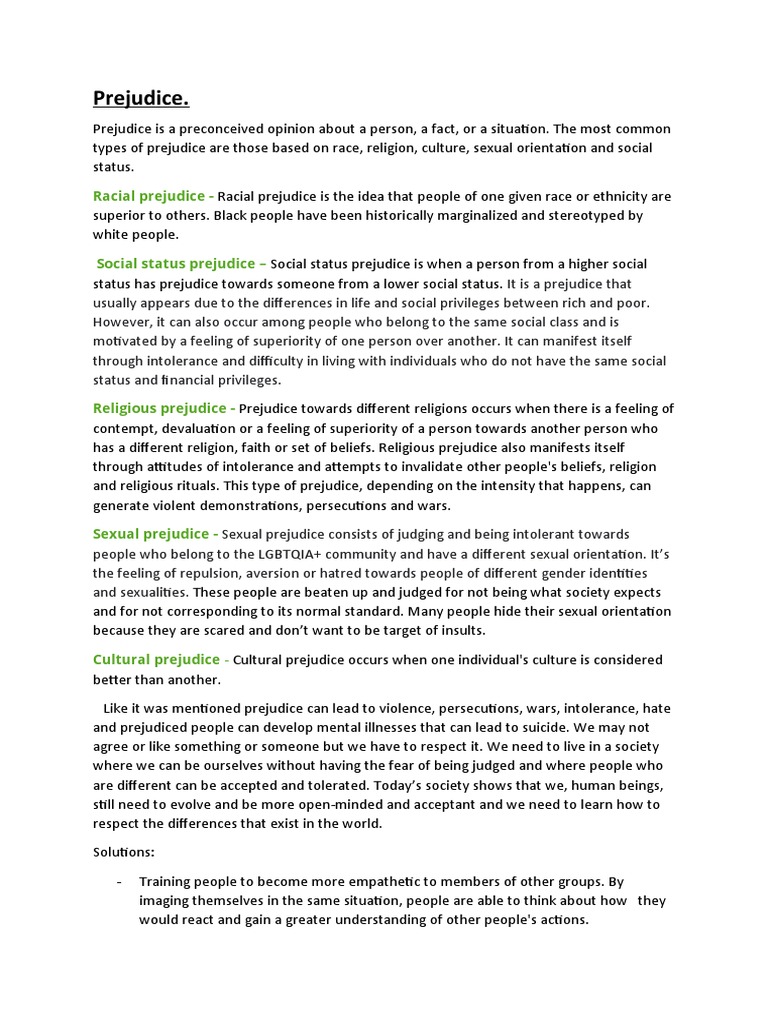Prejudice, often perceived as an inherent aspect of human nature, evokes a myriad of responses across cultures and ideologies. It manifests not only as a personal bias but as a pervasive societal ailment. In exploring the Baha’i perspective on this topic, one uncovers a profound understanding that challenges conventional notions of prejudice as merely a facet of human behavior. Instead, Baha’i teachings offer an illuminating framework that not only demystifies the attributes of prejudice but also underscores the possibility of transcending it through spiritual evolution and community engagement.
To apprehend the Baha’i viewpoint on prejudice, one must first consider its definition and implications. Prejudice refers to preconceived opinions or judgments about individuals based on characteristics such as race, gender, nationality, or socioeconomic status, often lacking factual basis. Such biases can lead to discrimination, conflict, and fragmentation within humanity. The Baha’i Faith posits that prejudice is not an immutable trait of human nature, but rather a superimposed condition, cultivated by societal influences, misconceptions, and lack of education.
At the heart of Baha’i teaching is the concept of the oneness of humanity. According to this core principle, all human beings are created equal, endowed with inherent dignity and worth. This perspective challenges the foundational premises upon which prejudice often rests. By advocating for the understanding that diversity is a manifestation of God’s creativity, the Baha’i Faith encourages individuals to appreciate differences instead of viewing them as barriers. The acknowledgment of shared humanity engenders empathy, allowing for a broader comprehension of the collective human experience.
Moreover, Baha’i teachings emphasize the transformative power of education as a conduit for fostering understanding and eradicating prejudice. Knowledge is heralded as the antidote to ignorance—the root of many prejudiced beliefs. Through the lens of education, one gains insight into the rich tapestry of cultural, religious, and individual variations that make up the human race. Education not only cultivates analytical skills crucial for examining biases but also nurtures moral development, fostering virtues such as compassion, understanding, and justice.
Integral to the Baha’i response to prejudice is the emphasis on spiritual guidance that encourages self-reflection and personal transformation. The journey towards overcoming prejudice begins within. Individuals are called to interrogate their own beliefs, biases, and behaviors, engaging in an introspective process that aligns with Baha’u’llah’s teachings. This inner transformation is essential; it fuels a deeper understanding that extends beyond personal biases, challenging societal labels and stereotypes that pervade public discourse. In essence, the Baha’i Faith advocates for a dual approach: rectify the self and engage with the community.
The Baha’i community serves as a microcosm of the broader aspiration for unity. Here, individuals from divergent backgrounds coalesce, sharing experiences and insights that illuminate the shared struggles against prejudice. Such communal interactions inherently challenge personal biases, facilitating an environment where preconceived notions are dismantled, and genuine connections formed. The spirit of fellowship nurtured within Baha’i gatherings fosters a deeper appreciation for diversity, reinforcing the significance of collective progress over individual differences.
Additionally, the Baha’i perspective articulates the concept of ‘progressive revelation,’ which refers to the continuous unfolding of divine guidance throughout history through various manifestations of God. This belief implies that as humanity evolves, so too should its understanding of justice and equality. Acknowledging that societal evolution is a gradual process encourages patience, resilience, and collective action toward a more equitable world. Thus, the journey against prejudice is not merely about confrontation but about nurturing an evolving consciousness that respects and cherishes diversity.
Despite the seemingly insurmountable nature of prejudice, Baha’i teachings offer a hopeful vision of transformation. The spiritual and practical tools provided empower adherents to actively participate in the betterment of society. This entails not only personal accountability but also advocating for policies and practices that uphold equality and justice in social structures. In doing so, Baha’is are called to embody the values of service and compassion, extending the ideals of unity beyond their immediate communities towards a global context.
As the world grapples with rising tides of polarization and division, the Baha’i approach stands as a testament to the potential for change. Through thoughtful engagement with the principles of education, reflection, and communal interaction, individuals can dismantle the barriers erected by prejudice. Ultimately, the Baha’i Faith presents a compelling argument: prejudice is not an indelible aspect of human nature, but rather a challenge that can be surmounted through collective action and spiritual evolution. As individuals internalize these teachings and foster an environment of inclusivity, a tangible shift in perspective emerges, underscoring the promise of a world united in its diversity.
In conclusion, the Baha’i response to the question of whether prejudice is simply human nature is one of profound optimism. It denotes a call to action—an invitation to embrace our shared humanity, transform our perspectives, and contribute to a future where prejudice is a mere whisper of the past, and the oneness of humanity is celebrated as a universal truth.
